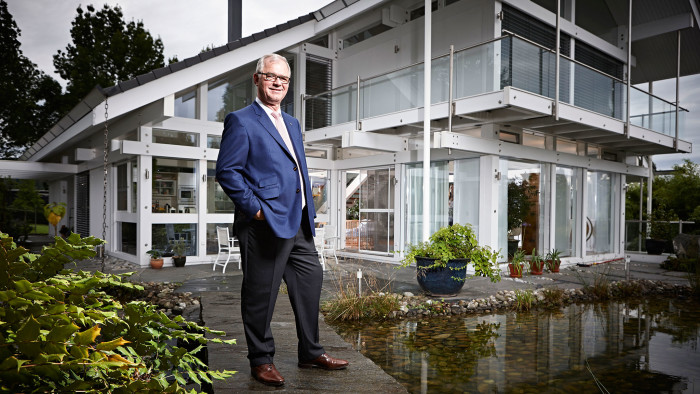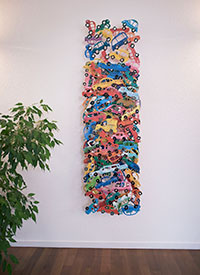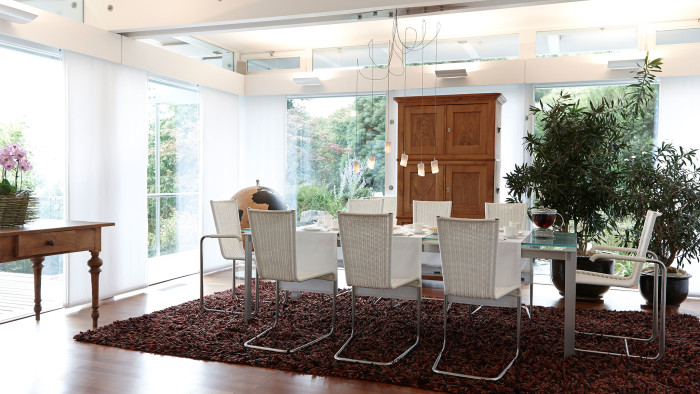Huf Haus chief on why we should live in prefab homes without walls

Simply sign up to the Life & Arts myFT Digest -- delivered directly to your inbox.
Georg Huf — pronounced Hoof — is the director of a medium-sized German company that builds prefabricated houses. His wife bakes cakes and his company grows a little bit each year. He has a modest paunch. He is orderly. He is ordinary.
But to some, this 59-year-old man is something else. To them, he is the leader of something full of wonder.
Huf Haus was founded by Huf’s grandfather in 1912. It began as a carpenter’s shop. It is owned and run by Hufs and these Hufs have been building houses since the 1950s. The company is based in Hartenfels in the Rhineland, Germany. The annual turnover is €79m.
What of these prefabs? They contain masses of glass, they are friendly to the environment and the style is a mixture of Huf, Bauhaus and traditional post-and-beam.
In brochures, they look brand, spanking new — they menace the viewer with their modernity. Yet to be inside one is to be seduced by light and space.
Other houses are cramped and dark, by comparison, with too many walls and too many doors and not a window worthy of the name. Other ordinary houses are simply un-Huf, you see.
The seduction does not occur at once for me. It comes in degrees, as Huf talks mellifluously about his life and house. Perhaps the point of no return occurs when Huf uses the word “wonderful” for the 10th time.
My favourite thing

Huf’s treasured possession is his brandschrank. There is no real translation for it, the PR tells me, but, more or less, it is a cabinet that divides into three parts with handles on the side. “That’s now 150 years old,” says Huf. “Today you don’t need it, but 150 years ago there were a lot of problems with fire and war.” When such problems arose, people would leave home taking a brandschrank containing their possessions with them. “It’s a good idea,” says Huf. What does he keep in it now? Porcelain.
He is describing how Huf philosophy has evolved since the 1950s. “At first the houses were more closed, more traditional.” But that has changed. Huf’s own house — where he has lived since 1999 and where we sit now, flanked by his wife, Iris, and his public relations officer, Ann-Kathrin Laskowski — contains one wall inside. One. Everywhere — bright space and windows. “We want to be free, we want open space, we want no walls,” says Huf. “No cave.”
It is easy to spy on people who live in glass houses, I venture. But that’s OK, apparently. Even the roof is open. “Why not? It’s wonderful. You can see the fog, you can see the rain. It’s nice, it’s a pleasure. Why not? All the people close their houses, why?”
Bemused by all this folly, Huf’s eyes skip with merriment — here is a gentle evangelist, zealously denouncing walls. “You can sit here in the evening and have the moonlight. It’s wonderful.”
It may be, yet while most Huf houses are built in remote beauty spots, Huf’s house is part of the Huf Haus Village. There is a path from the garden to the office; and the factory is close by. Half a dozen Huf homes are dotted about his one, but they are empty — just for show.
Isn’t it a bit weird living in a show village? “No. It’s wonderful, it’s wonderful,” says the happy Huf. “It’s our own world here. We are able to build our own village. It’s wonderful — the gardens, the houses. It’s like we want to live.”
Huf was born in Hartenfels. He is the second of nine children and he has worked for the family firm for 36 years. He has lived on site most of his life.

Every house is built in Hartenfels, transported by lorry in bits and assembled with speed and efficiency. Each one is bespoke and detail is highly prized. If you choose to build a small one in Hartenfels, you could pay €500,000. If you go for something larger and select a plot in the foothills of the Himalayas, you will pay more. Roughly, your Huf Haus home is 20 per cent more expensive than your common-or-garden “cave”, says Huf.
But there are savings, too, both economic and environmental. “Now we are heating with ice,” says Huf. Ice? “Yes.” It’s true. None here can explain it, but the press pack is unequivocal: “By harvesting the energy generated when ice turns to water, the house can be heated and cooled on demand and will never receive an energy bill.”
Green is key to Huf Haus philosophy — their cars are pea-green, which is a sign. Homes can operate off grid often; but in five years Huf wants total self-sufficiency — goodbye grid entirely.

So far four houses have been built in China. Every country in the world must have Huf houses, surely? “I’m not sure.” Huf is dubious. “It’s far away, it’s very expensive.”
He builds 150 houses a year. Why so few? “I think it’s enough,” says Huf. “The market we have is constant.”
Would he like a factory in China? “No, we are staying here.” But what if he wants to build more in Asia? Why not have another factory? “It would be possible,” Huf concedes, “if we had 10 children, maybe.”
They have only four — Alexander, Bendikt, Sarah, Christian. Having Hufs run Huf Haus is key to Huf Haus philosophy. Huf is Huf. No argument.
Families don’t argue, says Huf, which is good for business. Mine argues, I say. But Hufs don’t. The Hufs are very happy? “We are, yes.”
But what about the Huf employee, who is not a Huf by blood and so will never be boss? Perched beside her boss, the PR confirms that she is happy, too.

Besides, “nearly all the managing group is in this company more than 30 years, so it seems to be a family,” adds Huf. One employee has been with them for 42 years.
Huf is impeccably polite; his English annunciation is almost dainty. Is he a frightening boss? “No, no, no,” says Huf.
“He’s friendly,” interjects the PR. “I think he’s a team player,” his wife adds.
“Team player,” Huf agrees. “The process is democracy.”

What is he most proud of? He hesitates — his cheeks are rosy — the question feels immodest. “We are proudest of our children,” says Huf.
How would he define success? “Success is if we have enough clients to grow a little bit, but not too fast.” Huf is a slowly-but-surely businessman — a race-winning tortoise.
But he is not stuffy. Nor is his house. A pond shimmers beneath the stairs. Is that normal? “No,” says Huf. “It’s special.”
Floors, stairs, bath, banister — everything is cherry wood. (You can have any wood you like, but cherry has a cherry hue and a warm vibe.) Everything is neat. No books. Books could work in a Huf house, but not too many because books need shelves, and shelves need walls, and walls, as we know, are the opposite of openness.

In the hall hangs a work of art by David Gerstein — bright coloured cars, tumbling on top of each other; Huf points out his favourite one — pea-green. For his 50th birthday, the trainees made him an oak wood globe, which lives in the kitchen. They knew he likes to travel.
Can we go upstairs? “It is not so cleaned above,” he warns. It is spotless, the light grey carpet, soft like liquid velvet. Up here belongs to Huf and Iris (the children get the basement) and walls are still unpopular. “You really don’t need the walls.”
Huf’s bath is freestanding. Cherry wood. Exquisite. “If you have wood it’s always warm,” he says. “I would never take a bath in stone, never.”

Two large vessels rest on the landing, filled with matchboxes and sugar. Huf used to collect matchboxes on his trips abroad. Then everyone stopped smoking. “Now I take the sugar.”
We sit down to an immaculate tea with two home-baked marble cakes.
What could you do in a house like this? Learn to waltz or paint or practise yoga. Eat cake. Meditate. Waft about barefoot. There is no going back. I return to my cave a Huf evangelist.
Alexander Gilmour is deputy editor of House & Home. He was a guest of Huf Haus
Photographs: Frank Beer
Comments